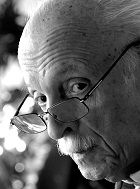Sós László
1922 - 2016

Sós, László
László Sós worked under the name "So-Ky" with his wife, Éva Kemény. An artist couple who have been working together since the beginning of the 1950s, they were highly effective and convinced propagandists for the socialist system. In addition to political posters, they worked in every field of visual communication.
Éva Kemény studied at the University of Applied Arts between 1941 and 1949; her masters were Béla Molnár and Pál Mihátz. László Sós was a student of the Aterlier Studio and workshop school in 1942; he studied from Dezső Orbán and István Irsai.
Beyond their commercial posters they got deeply involved in politics. They soon became acknowledged by the state and were awarded prizes and important positions in artists’ communities. After the political transformation of 1989, they continued to work for political causes, including the leftist party MSZP and for environmental initiatives.
Their posters represent the typical visual culture of the 1960s, illustrating a style known today as “retro” or socialist modernism that defined the furniture, architecture, and graphic design of the period. After the decline of mandatory socialist realism, a new trend became influential. It combined typical socialist subjects (the life of workers, factories, family, agriculture) with a modern attitude and style: they have used a style close to constructivism. This tendency, now called soc-modern, became significant in the eastern bloc in the 1960s.
So-Ky use several techniques, like paper cut, drawing, photo, photomontage and they often have used only clear typographic design. For their political posters they use simple but effective forms and symbols, sometimes without any text. For example, the red sickle and hammer and ripped barbed wire stand together for the “liberation” of 1945. So-Ky prefers to use symbols like the red star, or the Soviet and Hungarian flag. They have often worked for the new national festivals: anniversaries, like that of the “Liberation” or of the October Revolution. On these posters they employ numbers as visual elements. Some of their works propagate the slogan “war for peace,” a typical mantra of the Cold War period. On these designs, the United States often appears as the evil enemy.
We can say that So-Ky created a new understandable visual language for political propaganda that dominated this field until the 1980s. They were very productive, and received numerous commissions.
Besides propaganda they designed commercial and movie posters as well, such as the poster for the classic movie Some Like it Hot. Their soc-modern-influenced style is mixed with other tendencies, for instance Op Art on their commercial designs. So-Ky received several orders from the biggest companies: shopping centers, shoe fabrics, rubber factories, and many others. They preferred to construct compositions using the contrasting effect of black-and-white, or to use dominant, contrasting colours over large areas. Their constructivism-inspired style was suitable for modern emblems as well as for the logos of companies, such as the logo of industrial fairs or of Comecon. .